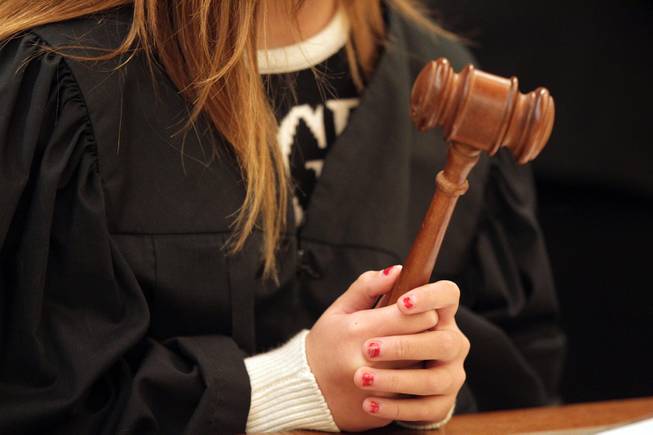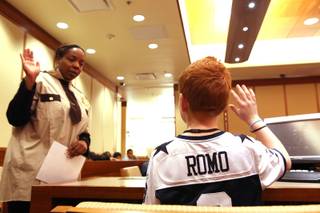
A child plays the role of the judge during a role play session in Kids Court School inside the Thomas and Mack Moot Courtroom at UNLVs William S. Boyd School of Law in Las Vegas on Thursday, December 13, 2012.
Tuesday, Dec. 25, 2012 | 2 a.m.
Sun coverage
The young witnesses called to the stand give the same story every time: Their blue bike is missing, and they saw a man wearing a purple suit take it.
That’s the simple part.
Here’s where it gets tricky. As the youngsters recount their story, they must understand words like testify, oath, bailiff, trial and defendant — vocabulary common on legal shows but rare on the playground.
They are participants of Kids’ Court School, a 10-year-old program at UNLV’s Boyd School of Law that recently earned an award from Harvard University.
“It’s really important for kids to have a voice in court when there are proceedings pertaining to them,” said Rebecca Nathanson, director of Kids’ Court School. “This is a great program based on theory and empirical research that could really help decrease kids’ anxiety and enhance their ability to testify.”
Nathanson credits the program’s nonbiased approach to its success. The program educates children — who might be crime victims, witnesses or even defendants — about the justice system without coaching them about their testimony, hence the pretend story about the stolen bike.
Students, ages 4 through 17, attend two sessions. During a classroom-style session, they learn the nuts-and-bolts vocabulary necessary to comprehend a legal proceeding. A week or so later, they return to review the material, learn methods to cope with anxiety and participate in a mock trial.
On a recent afternoon, law student Dawn Hathaway Thoman plucked a purple figurine from a small-scale, model courtroom sitting on a table next to two children.
“Who can tell me what this man’s name is?” Thoman asked. “It starts with a D.”
In unison, the boy and girl answered correctly — “The defendant!”
It’s review time before they participate in a mock trial. They have learned courtroom vocabulary and have memorized their pretend story about the stolen bike. Later, law students posing as defense and prosecuting attorneys will question the children as witnesses.
Nathanson studied children’s testimony as a research fellow at the UCLA School of Medicine in the early ’90s, a time when the legal community frequently squirmed at the thought of using child witnesses.
“One thing we found was kids knew very little about the legal system,” she said, referring to her research. “You ask kids, ‘What’s court?’ and they say it’s a place to play basketball.”
After Nathanson found her way to UNLV, where she is a professor of educational psychology and law, she pitched her idea for Kids’ Court School. The idea followed the theory guiding doctors to explain invasive medical procedures to children: The more the children understand the situation, the less anxiety they will endure.
Kids’ Court School had its debut in 2002 and served six students that year, Nathanson said. Since then, more than 730 children have participated in the program.
Many child participants are the victims of some type of abuse, who will testify when the suspect goes on trial, Nathanson said.
The juvenile division of the Clark County District Attorney’s Office, Legal Aid Center of Southern Nevada and certain judges frequently refer children to the program, Nathanson said.
The legal community has never challenged the program’s integrity, she said.
“We enable kids to be able to testify better but, at the same time, protect the rights of the accused,” Nathanson said.
That’s why the children’s case details are never discussed during the sessions.
On a recent Thursday afternoon, a 9-year-old boy wearing a Dallas Cowboys jersey slid into the witness stand at the Thomas & Mack Moot Courtroom. The mock trial room boasts all the bells and whistles of a real courtroom, including a gavel.
An “attorney” — one of several law students who volunteer to help run the program — stepped forward and began lobbing questions the boy’s way:
“Why are we here?”
“Who do you think stole your bike?”
“You say you leave it in the same place every day?”
“Have you ever forgotten anything?”
“So isn’t it possible you forgot where you put your bike?”
The boy, sometimes speaking quietly, answered every question and smiled when he finished.
His mother, Kristanne Pedersen, watched from nearby and praised the program afterward, calling it a confidence builder for children. Pedersen said her son witnessed a bullying incident in a local park and would be called to testify.
“The use of props is always important for kids, and this is a props-rich experience,” she said. “This was a very nonthreatening experience.”
The program’s distinction as a Harvard Bright Ideas winner in October means the concept could be duplicated around the country and even the world, Nathanson said. She has received queries from as far away as Australia.
In the program’s decade of existence in Las Vegas, Nathanson said it has survived by finding “creative” ways to stay afloat. The program receives no direct funding.
Still, no child has ever been turned away, she said.
“If we had money, there’s so much more we could do,” she said, citing research as an example.
Nathanson said she thought the legal community had adopted a more accepting view of child testimony in the wake of the program.
“Each and every kid has a story to tell and wants to tell their story,” she said.
For more information about Kids’ Court School, call 702-895-5933.


Join the Discussion:
Check this out for a full explanation of our conversion to the LiveFyre commenting system and instructions on how to sign up for an account.
Full comments policy